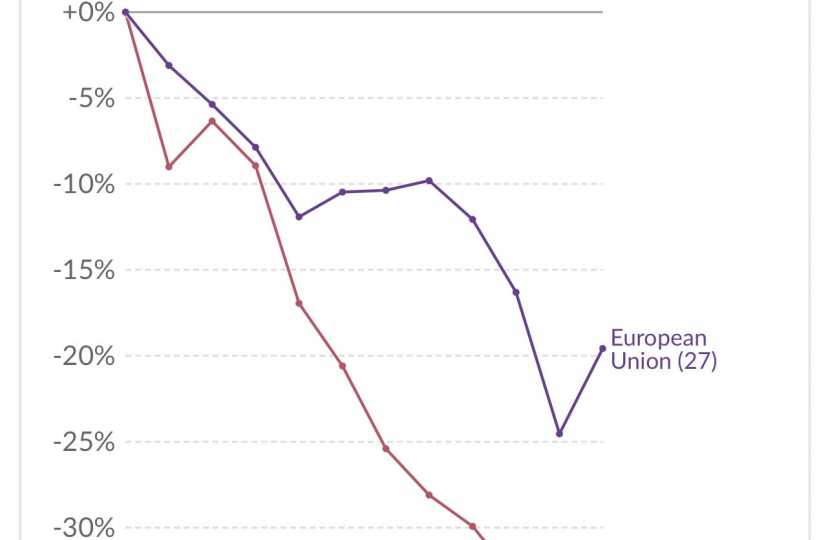
Let me be clear. I am disappointed by the way and timing these changes were announced and indeed many of the changes full stop. I, like many people, am a firm believer that we need to decarbonise our economy, our energy production and the way live our everyday lives as much as reasonably possible.
However, I recently wrote to the Prime Minister about the 14.1% of constituents across North Devon that live off the gas grid. Those households faced the prospect of having to switch to a low carbon heating system, which is either technically challenging, highly disruptive or extremely expensive because of the location, age and construction of their homes in just three years’ time. These households were worried and had written to me to raise that they are not being given a fair choice about how they decarbonise their heating. The Climate Change Committee had already stated themselves that the 2026 deadline for these changes was unachievable.
I asked that Hydrotreated Vegetable Oil (HVO) should be supported by the Government at Report Stage of the Energy Bill on 5th September, and it indeed was included in the Energy Bill.
HVO is produced from waste products, such as used vegetable cooking oil, animal fat residue and tall oil, a by-product of wood pulp manufacture. It is independently assessed in terms of sustainability, and also passes the strict UK Government benchmarks as a sustainable fuel. Indeed, the Government already encourages its use in transport.
Industry has also proven that it works, with strong evidence from 150 demonstrator sites across the UK that the use of HVO reduces carbon output by 88% and only costs around £500 for households to convert their existing boilers. This is compared to costs of between £20,000-£30,000 to install a heat pump and to undertake all the necessary retrofitting and insulation works required to make it effective.
This was in my mind one of the many problems we faced in practically doing what we do need to do to further reduce our carbon emissions.
I have also been contacted by many local landlords who were planning on selling up and evicting their tenants as there was no chance that they would be able to make their properties energy efficient enough to keep renting it out. They would sell or turn their properties into holiday lets, further impacting the lack of housing affordable to local people who work in North Devon.
Something had to be done, the timing of all these measures had yet to be determined but the mere threat was damaging our rental market right now. There are other ways to make our homes more energy efficient and we are already making a difference.
The number of homes with an Energy Efficiency Rating of C or above is 46%, up from 13% in 2010.
The Social Housing Decarbonisation Fund and Home Upgrade Grant are collectively worth £1.4 billion, which will be used to fund energy saving measures ranging from loft insulation to new windows. An additional £1.1 billion in match funding for social housing provided by local authorities, providers of social housing and charities will bring the total investment to £2.5 billion to upgrade social and private homes in England.
Our North Devon Homes secured £1.5 million match funding following a successful funding bid by the South West Net Zero Hub. The work will fund ‘fabric first’ measures to around 120 of their properties and they are bidding for more.
We do not always hear of the work that is happening here to improve our housing stock and there are plenty of funds that any landlord or homeowner could and should look into.
Please do apply for grants to support insulation in your home, or if your home does not have a gas boiler you can apply for the Home Upgrade Grant.
You can check if you are eligible for the Great British Insulation Scheme here: https://www.gov.uk/apply-great-british-insulation-scheme
If you are a homeowner in England and do not use a gas boiler as your main heating system, you can apply for the Home Upgrade Grant here: https://www.gov.uk/apply-home-upgrade-grant
The UK has done more to decarbonise its economy that any other major nation. However disappointing some of these changes are, it is right that the Prime Minister is honest with us about the cost of our journey to net zero, and also that some of the measures are just genuinely impractical and, in some cases, damaging.
The short term disappointment in these changes do offer some hope. All of these changes would have cost households a lot of money and whilst government would have helped, this would have ultimately also been taxpayers money as well.
The pragmatism in the Prime Minister’s speech is welcome, as is his long term thinking.
We can look back and despair that action was not taken sooner to decarbonise our energy supply. The success of some projects like offshore wind has been recently marred by the original design of the ‘Contracts for Difference’ scheme and decisions by senior UK politicians to not invest in nuclear in 2010 because the benefits would not be felt till 2021/22 are infuriating.
This is also why I founded and took on the chair of the All Party Parliamentary Group for the Celtic Sea, which has a key role to play in Floating Offshore Wind. The fact that no contracts were signed in the leasing round AR5 is incredibly frustrating but I have met with the Energy Minister and the new Secretary of State since this announcement and both have reaffirmed government commitment to floating offshore wind, and a to ensure that AR6 is successful.
We will need to massively upgrade the amount of energy we are producing in the future and for security purposes, it needs to be homegrown. With an excess of renewable energy and that is what we will need it will become cheaper, and we will need to store it and move it. However, many projects have been blighted by the electricity grid which the new Secretary of State is already taking strides to tackle.
One of the biggest and possibly most overlooked part of the Prime Minister’s speech was the end of ‘queuing’. Right now, there are gigawatts of renewable energy projects on hold, waiting in the ‘queuing’ as mandated by Ofgem. There are hundreds of local businesses and farmers here in North Devon, stuck in that same queue, unable to decarbonise, unable to invest in reducing their energy bills. I have already spoken to National Grid who are delighted this nonsense is ending and these changes will initiate massive upgrades to our power transmission network.
The technicalities of how we reach net zero aside, we must bring everyone on this journey and that journey will be achieved, but it needs to be done in the best and most pragmatic and responsible way.
The timescales and measures that the Prime Minister changed or removed were popular with some, and deeply unpopular with others. There was never any decision to be made that would have been well received, so the Prime Minister, overall, made pragmatic decisions as to reach these targets would have been either impossible or damagingly expensive.
After all of these changes, our targets are at least on a par, if not better than most of our European neighbours and we are still far ahead of, or on course to meet all our intermediate targets and we have done more to decarbonise that any other major economy.
The UK is already leading the way.


